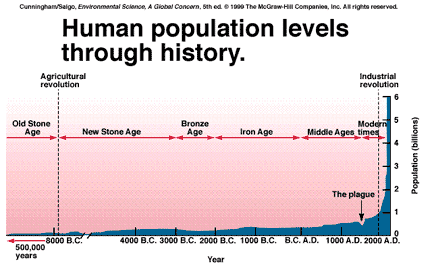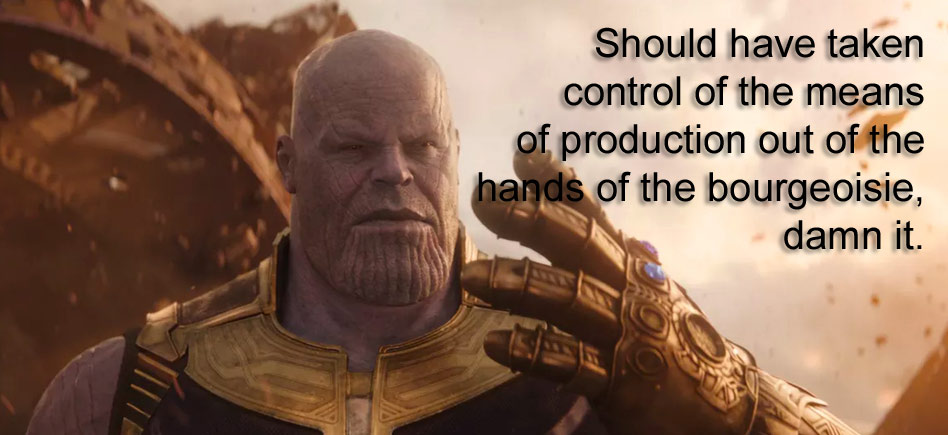At least people are finally making serious suggestions for how to respond.
spoiler warning for Avengers movies

I’ve been thinking a bit about Thanos’ idea in Eternity War: get rid of half of everyone. I found that whole aspect (i.e.: the core of the movie) of the movie to be absurd. Populations replace losses fairly quickly, so losing half of everyone would, perhaps, set the population clock back a few decades. So what?

Estimates are that the black death reduced the planetary population by about 25% – from ~400 million to ~300 million. Replacing the loss took less than a century. So, in the Thanos scenario, universal population would be replenished within the lifetime of the grandchildren of the survivors of the catastrophe.
Then, there was World War I and the “Spanish” Swine Flu. The war killed a few million (small compared to World War II) and the flu between 20 and 40 million. That population drop was noticeable, but it replaced itself within a generation. Pasteur had a bigger impact than the plague, yay, science!
The other premise of the movie is that, 5 years after the Thanos Catastrophe, everyone is still sad and traumatized by the loss. Sure, people would still be talking about it, but I very much doubt that humanity would change in any big way; look at it this way: it’s not as if World War I dramatically changed human behaviors – World War II happened within a generation of the “war to end all wars.” I would not expect humanity to sit around despondent and drunk after Thanos wiped out half of them – they’d shrug and get back to work. There is a study I recall hearing about on some podcast, that following the black death, compensation for labor went up, the cost of land went down, and a lot of businesses started up, to fill adjusted market needs. That period of adjustment was known as “The Renaissance.”
In other words, I expect that Thanos’ gesture wouldn’t have worked and Thanos ought to have been wise enough to realize that, and inflict a persistent super-plague that kept populations down, permanently except that we sort of already had that, in the form of Measles, Smallpox, and Swine Flu. Basically, we’d just fuck harder. For the incel population, Thanos’ Catastrophe would be a fantastic reset (and for the rest of us, it would mean half of the incels would be gone, too, along with half of the nazis and half of the political class and superbillionaires) I think Thanos’ heart was in the right place but his methods were unsound.


I must be incredibly unloving and shallow because my immediate reaction to the Thanos Catastrophe was:
- 50% chance I’m vaporised and no longer have to care about this stupid movie
- 50% chance I survive and, within 1 year I will be busy doing fun stuff again and will periodically miss such-and-such friend but I’ll be too busy filling in the new opportunities that all the gone people have created
- There will still be pizza and red wine after the Thanos Catastrophe, right?
So when was the last “sustainable” human civilization? The Bronze Age? The problem is not just population, it’s what all those people are doing. Global warming is a consequence of both population explosion and technology. It’s my opinion that war (and by extension, authoritarian government) is the main driver behind technology, although capitalism sets up a feedback loop that always attempts to create and capture more surplus, which just makes the problem worse.
During the entire excruciating length of the movie, I kept thinking “a nuclear war would be so much worse than Thanos’ Catastrophe because of its lingering effects.” I’m mind-boggled that we’d place ourselves in the path of a disaster like that, knowingly and deliberately, and be willing to pay so much in order to do so.

My immediate reaction was that if Thanos’ strategy was the best, he’d have to re-apply it frequently to keep the population where he wanted it. After a cycle or two, folks would have to always be expecting that they other shoe would drop on them or theirs sometime–maybe folks would choose more of an ‘r’ versus a ‘K’ type reproduction strategy.
spoilers ahead…. A bit late for anybody reading the comments, but I’ll write it anyway.
I doubt anyone would suggest that human behavior itself would change so dramatically. There would still be all sorts of big consequences (just not perhaps of that kind), which the movie completely neglects.
I’m sure you understand this, but there was more to it than just the plague. Europe was already changing in some fairly significant ways, but these things sometimes take centuries (or more). I think people tend to make the distinction between before/after way too sharp. The absurdly ahistorical version of events is that it was all “Dark Ages” then suddenly everything changed into “Renaissance.” The next thing you know, it’s already the “Enlightenment” — practically modernity! — if there’s even supposed to be a difference (other than the dates) from the “Renaissance.” People usually aren’t too clear about that either.
Anyway, wiping out half of all life in the universe would be a seriously bad idea. It would have been interesting to actually see the five year period which was skipped over in Endgame. [*] Tons of people were gone, lots of confusion, lots of fighting, political systems collapsing, ecosystems collapsing, who knows what…. Earth could have turned into a post-apocalyptic wasteland — maybe other planets did? — especially given that tendency you mention for people to always find a way to conduct more wars inside of conflicts wrapped up in belligerence, whether or not they’ve (barely) recovered from the previous round of devastation.
But the movie doesn’t try to make sense of things at that scale, only a very personal scale: you just see some sad faces, then laugh at Thor’s drinking problem, and maybe wonder why Hulk is doing so well now when he’s been a total mess even in the best of times. Going into it, I didn’t expect great writing, but non-terrible writing would have been nice. It’s got to be pretty disappointing for anybody who wanted something more substantial than a bunch of fan service and fight scenes.
The second “snap” (from Hulk) which brings everyone back would also be sort of catastrophic. It means that instantly the population of Earth doubled, after five years of settling (implausibly) into the fairly stable situation that we see in the movie. That’s … bad. It might be the biggest “Hulk smash” ever, but in the movie it’s treated like a non-issue, the only solution to their only problem.
It’s not clear how there would be “more resources” (particularly food) to go around for people, if other organisms (plants, non-human animals, etc.) were also eliminated in Thanos’ snap. Leaving aside damage the sudden change causes to various ecosystems, it seems like the result would more or less be a scaled down version of the same basic situation. Populations wouldn’t need to grow into a problematic state again, because they were already in one all along (according to Thanos’ views on what’s “problematic”). Consider for instance that there were wars and so forth, even when the human population was much smaller, centuries or millennia ago. It’s always been hard to see how that would have fixed anything, as opposed to fucking up everything. But very strangely, people talk as if he had a sort of reasonable idea and just “went too far” with it.
[*] It would also be interesting because Hulk, Thor, Hawkeye, etc., could have been given actual character arcs. By that I mean that you could see them struggling through that whole period, making good or bad choices, and changing gradually as a result. You wouldn’t just hint (like the movie did) that somehow they became very different from the characters we knew in earlier films.
Ouch. I’d rather lose either 100% or 0% of my body at random than 50% of my body for sure.
PS
Not having seen the movie, I thought the *poof*ing of half the population would be limited to people. But if *that* is the premise, then it’s just plain stupid.
(Losing half the biomass?! In the universe?! Got nothing on YHVH! ;))
Totally with you on the untenability of Thanos’ big plan, and the depiction of the consequences also required giving the writers a very large pass. If only they’d hired Joss Whedon; then at least it would have been funny.
I really wanted to see a conversation along these lines:
Ironman “Why did you do it? Why did you kill half of everyone?”
Thanos: “Kill half of everyone? Absurd! Slander! You must think me a monster. I simply quantum split this shard of the multiverse and had 1/2 the population shift to the other branch. They’re fine!”
Thanos was half right, should have gotten rid of the other half too.
I think the last sustainable human population was stone age; once you start building cities it’s all downhill (of course i have no real basis for this claim)
dangerousbeans:
It’s flawed, not just baseless; clearly, the population has successfully sustained itself since the stone age, lo those many, many generations ago.
—
Kevin Dugan, that’s rather clever — very nice indeed, nice and ambiguous.
@John Morales
sustained it’s self by using increasingly more resources and destabilising ecosystems. 80,000 year of indigenous in habitation in Australia, and then in the last 200 years we have desertification, salinization, and mass extinction.
still, i suppose by your logic any number is sustainable until we get a population crash